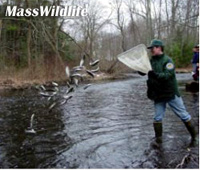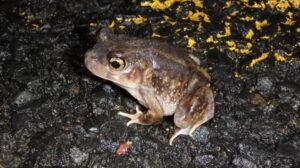 Of the 500,000 trout that MassWildlife will be stocking statewide this year, approximately 100,000 will be stocked in the Western District. Last week, subject to last minute change, the following local waters were scheduled to be stocked: Farmington River in Otis, Tolland and Sandisfield; Deerfield River in Buckland, Charlemont and Florida; Middle Branch of the Westfield River in Middlefield, West Branch of the Westfield River in Chester and Huntington, Main Stem of the Westfield River in Huntington, Montgomery and Russell; Laurel Lake, Richmond Pond, Stockbridge Bowl, Pontoosuc Lake, Lake Buel and Stockbridge Bowl.
Of the 500,000 trout that MassWildlife will be stocking statewide this year, approximately 100,000 will be stocked in the Western District. Last week, subject to last minute change, the following local waters were scheduled to be stocked: Farmington River in Otis, Tolland and Sandisfield; Deerfield River in Buckland, Charlemont and Florida; Middle Branch of the Westfield River in Middlefield, West Branch of the Westfield River in Chester and Huntington, Main Stem of the Westfield River in Huntington, Montgomery and Russell; Laurel Lake, Richmond Pond, Stockbridge Bowl, Pontoosuc Lake, Lake Buel and Stockbridge Bowl.
Also note that the Trout Stocking Report, with maps and tables including Stocking Date, Town, Waterbody and Species is available at Mass.gov/trout.
As you are well aware, we are not out of the COVID-19 woods yet. Even if you have received both vaccine shots it’s still a good idea to take precautions to prevent any possibility of spread by maintaining a distance of at least 6 feet from others, wearing a mask and washing your hands frequently. Avoid congregating in parking areas, on boat ramps, or along the shore and have a back-up plan if your usual spot is crowded.
Wear a life jacket
If you plan to fish from a boat, it is recommended that you wear a life jacket because accidents often happen too quickly to reach and put on a stowed life jacket. Wearing a properly fitted life jacket (personal flotation device) could save your life. History has shown that most boating fatality victims were not wearing a life jacket. In Massachusetts, life jackets must be worn by:
- Canoeists and kayakers from September 15 – May 15 (including waterfowl hunters)
- Youth under 12 years old
- Personal watercraft users
- Waterskiers
Fishing Derby
The Berkshire Hatchery Foundation in Hartsville-New Marlborough just got the go ahead to hold monthly free children’s fishing derbies this year. They are scheduled to have one next Saturday, April 10 from 9:00 to 10:30 am at its Lower Pond at the Berkshire National Fish Hatchery, 240 Hatchery Road, Hartsville, MA. Children aged 13 and under must be accompanied by an adult. These fishing derbies will run once a month through September. Following State guidelines, masks are required and 6 feet social distancing is required.
Sweren chosen to lead MA/RI Council of Trout Unlimited
At its last meeting, the delegates of the MA/RI Council of Trout Unlimited chose Henry Sweren, of Lanesborough, to be its Chairman. He succeeds Paul Beaulieu of the Pioneer Valley Chapter as Chairman. Sweren most recently had served as the President of the Taconic Chapter of TU in the Berkshires from 2018-2020.
The MA/RI Council of Trout Unlimited is a grassroots conservation organization dedicated to protect, reconnect, restore and sustain the region’s coldwater resources. Part of the National TU organization which was founded in 1959, the MA/RI Council is the unifying body region wide, connecting more than 4,500 members spread among 13 chapters. Through advocacy, education and partnerships with other statewide conservation organizations, the Council works towards improving the ecological health of rivers and streams throughout the state. The MA/RI Council is a non-profit organization with 501(3)c status under the umbrella of TU National.
Replacing Sweren as the Taconic Chapter President is John Burns, of Cummington. He was the past MA/RI Council Vice Chair of Environmental Affairs for a few years. Sweren will also serve as the Chapter Vice President. Rounding out the officers of the Taconic Chapter are William Travis of Pittsfield, Treasurer and Fran Marzotto of Pittsfield, Secretary.
MassWildlife: Keep an eye out for critters coming to areas near you.
Watch for amphibians on the road
This spring, be mindful of amphibians as they emerge from their winter retreats and travel to breeding sites. Use caution while driving on rainy spring nights.
For many Massachusetts residents, spring rain is a reminder of the changing seasons. For smaller Massachusetts natives, like amphibians, spring rains signal it’s time to emerge from winter retreats and migrate to breeding sites. Unfortunately, many of those animals will face the daunting task of having to cross roads to reach their destinations. Spotted salamanders, wood frogs, blue-spotted salamanders, Jefferson salamanders, American toads, spring peepers, four-toed salamanders, northern leopard frogs, and eastern red-backed salamanders are frequently encountered on roads during early spring rains. Migrations may have started for some pool-breeding amphibians already.
They can be difficult to see, as they are generally small-bodied and move under the cover of dark.
Recommendations from MassWildlife as to how you can help:
- Drive cautiously and carefully.
- Whenever possible over the next 2 months, consider not driving on rainy nights when air temperatures are 40°F or higher. If you must travel during such conditions, delaying beyond the first 2 hours after sunset is recommended.
- Travel on larger highways rather than small, wooded roads if possible. Plan routes that minimize the number of wetlands or vernal pools passed.
- If observing amphibian migrations, consider arriving at your destination prior to sunset, and then conduct your monitoring on foot.
- If assisting amphibians across roadways or handling them for other reasons, be sure your hands are free of lotions, bug repellent, or other chemicals.
- Report high levels of amphibian activity or mortality to the Linking Landscapes for Massachusetts Wildlife initiative, which compiles data to reduce wildlife-vehicle collisions on problem roadways.
- If you encounter any of our state-listed rare amphibian species (eastern spadefoot, blue-spotted salamander, Jefferson salamander, and marbled salamander), take a clear photograph of the animal, carefully record the location, and submit an observation report to MassWildlife’s Natural Heritage and Endangered Species Program.
- Go the extra mile to help preserve amphibian habitat by certifying vernal pools on your property. The data you collect is used to help MassWildlife and local conservation organizations better understand habitat resources for our native amphibians.
Black bears are active and searching for food: take precautions
If you have bird feeders or if you keep chickens, bee hives, or livestock act now to keep bears wild and out of neighborhoods.
MassWildlife is reminding us that now is the time when hungry bears emerge from their winter dens and seek out food. If you live in western Massachusetts, or other areas where bears have been spotted, it’s time to take down your bird feeders. Natural foods such as acorns and other nuts are usually available on the ground, but, in some areas last year’s fall hard mast crop was meager. Bears will often ignore seasonally available natural foods including skunk cabbage in favor of an easy meal at a backyard bird feeder. Other species including wild turkeys and coyotes may also frequent bird feeders leading to a variety of nuisance issues. To avoid these problems, MassWildlife asks property owners to be proactive by removing bird feeders and other potential food sources including garbage or open compost. If you enjoy watching birds in your yard, MassWildlife suggests adding a water feature, growing native plants, shrubs, and trees to attract birds. Individuals should also secure bee hives, chickens, and livestock. Properly maintained electric fencing is the only way to protect chickens or bee hives from bears. Taking these actions may prevent the unnatural feeding of bears and other kinds of neighborhood wildlife.
There are at least 4,500 black bears in Massachusetts and their range is expanding eastward. Take action by educating yourself and your neighbors about proactive measures to avoid conflicts with bears. For more information about black bears in Massachusetts, visit mass.gov/bears.
Hunter Survey
You may receive a Novi Hunter Survey from the Massachusetts DFW. Nicole McSweeney, Outreach and Marketing Manager at MassWildlife, informs us that this survey is sent annually by MassWildlife staff. A sample of hunters who have provided their email addresses in MassFishHunt are sent this annual survey to better understand their preferences and efforts. This information helps MassWildlife biologists receive important “on-the-ground” data to aid in the management of game species. Depending on the variety of game you hunt, the survey takes around 10–20 minutes to complete. The survey is distributed through NoviSurvey and is set up so all responses remain confidential. I recommend that you respond.
